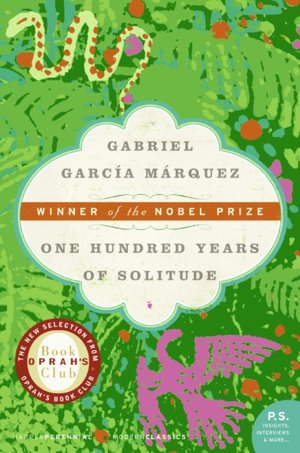When a book of this title actually uses the word “solitude” in select moments of the story, it ratchets me back into English Student mode. I’m suddenly studying for an essay question I will never be asked. “What does solitude mean in Márquez’s novel?” You don’t understand. I have to have an answer for that or I fail the book. I haven’t dealt with this complex since reading Franzen’s Freedom.
Clik here to view.

It’s amazing the kind of jacket art they can produce with sidewalk chalk.
Pablo Neruda thought of this novel as “the greatest revelation in the Spanish language since Don Quixote of Cervantes.” One Hundred Years of Solitude is one of the major 20th-century classics of world literature, and if you do not read it you are considered a substandard person.
Solitude is the saga of a mostly awful family cursed with a lack of creativity in naming their children. When a novel provides you a genealogical plot in the front matter, you know shit’s about to get real. But when I looked at the one Márquez provided and counted no fewer than 21 Aurelianos, it made me want to fight him.
But there’s a point to that. As a century-long story of the Buendía clan and their Colombian town of Macondo, Solitude deals with the cyclical nature of triumph and tragedy. You could think of the story as a spiral staircase, ascending from a seemingly primeval beginning of the family, winding around from boom to bust, hedonism to asceticism, noise to reflectiveness, and back again as the generations stack upon each other toward… who knows? By having so many José Arcadios and Aurelianos, the novel forces us to consider what makes each generation similar and different.
la Familia
My favorite character is the matriarch Úrsula, who humbly serves as the clan’s moral compass– and what a losing battle that is. It’s no exaggeration to say the Buendías bring about more deaths than ten Manson families. Arguably the most famous character is Colonel Aureliano, a startlingly quiet chap who leads a revolution against the government for decades and never wins a single battle. Other notable family members include “Remedios the Beauty” who absentmindedly drives men to suicide– up until one day she begins floating skyward and the heavens open up to receive her perfection (reminding me of Hawthorne’s story “The Birthmark”). The last José Arcadio returns home from failing to become the next Pope and discovers the buried family fortune. With gold in hand, he decadently remodels the Buendía home and throws naked parties with children in a pool of champagne.
Márquez is matter-of-fact in everything. He displays these people in all of their extravagant frailty, and he even slides the x-ray in front of unlikable characters like the ice queen, Fernanda del Carpío, so the reader will see their secret suffering. Their solitude, as it were. Colonel Aureliano discovers his existential crisis once he returns to Macondo a proud and paranoid war hero:
Lost in the solitude of his immense power, he began to lose direction. He was bothered by the people who cheered him in neighboring villages, and he imagined that they were the same cheers they gave the enemy. Everywhere he met adolescents who looked at him with his own eyes, who spoke to him with his own voice, who greeted him with the same mistrust with which he greeted them, and who said they were his sons. He felt scattered about, multiplied, and more solitary than ever.
For all its beauty and likable idiosyncrasy, the novel took quite a while to hook me. It’s another one of those that I marvel at from afar. Is it because Márquez is so much more accepting of his characters than I am? If so, that’s my problem and not his. It’s probably for this reason that I couldn’t truly sink into Solitude until the last seventy pages, when the Buendías start to figure out love– not love defined by duty, excess, possessiveness, or rebellion like their ancestors’ romantic failures. Late in his life, Aureliano Segundo figures it out with his concubine, Petra Cotes:
Madly in love after so many years of sterile complicity, they enjoyed the miracle of loving each other as much at the table as the bed, and they grew to be so happy that even when they were two worn-out old people they kept on blooming like little children and playing together like dogs.
You’re probably wondering why I haven’t mentioned magical realism yet. After all, this is the book for that. That’s worth another post that’s coming.
This book is a brilliant thing. While it never quite infiltrated my heart, Solitude has a supernatural quality that might put it in yours.
Read it if
1. You seek the grand-daddy of magical-realist novels,
or
2. Sweeping family sagas are your thing.
Image may be NSFW.
Clik here to view.
Clik here to view.
